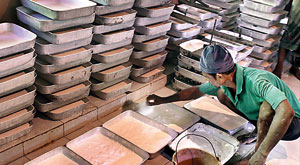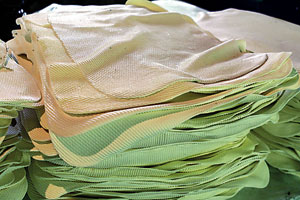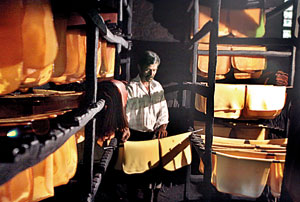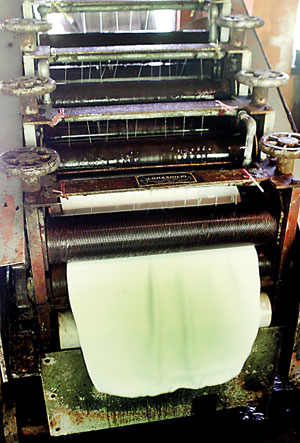Having spent the past few months immersed in a study of knowledge and information gaps in the rubber value chain, we were very pleased to read the recent feature in the June 12 edition of the Sunday Times (Plus) headlined “New spring to rubber trade” on the successful cooperative set up in by rubber smallholders in Padeniya.
Our research included conversations with a key mover in the Padeniya Thurusaviya society, Mr Berty Lionel. We agree that Padeniya is a great success. Where we differ is on the likelihood it can easily be replicated across the rubber-growing areas.
 |
| Pictures of the Padeniya project |
 |
 |
We wish it were so, but as researchers, we know that wishes do not equate with realistic policy recommendations. This article seeks to identify the conditions that will allow more Padeniyas to emerge, helping improve the livelihoods of the smallholders.
As the article well documents, the Padeniya Thurusaviya Society has a long history. The question that troubled us was why it had not been imitated all these years.
Its achievements are not a secret among smallholders and officials serving them. There is an entire government organization called Thurusaviya that seeks to develop smallholder societies. But in none of the rubber-growing districts where we conducted our research did Padeniya equivalents exist.
Even the Padeniya Samithiya is not expanding. Its success has attracted the attention of other smallholders in the area. Yet, membership has remained static at 38 for some time and no new memberships have been extended. According to Mr Lionel, the secretary of the working committee, the constraint is the number of traders attending the auction.
For the existing supply of RSS the present number of traders is sufficient. However, it has been difficult to attract additional traders. Without more traders attending the auction (increasing demand) the Samithiya does not want to expand supply.
The solution to this problem is not obvious. Rubber traders in Sri Lanka are a sophisticated lot unlikely to ignore reliable sources of high-quality rubber. We surmise there is a good reason for their diffidence. Some measures to reduce the transaction costs of attending too many small auctions may help.
The Ministry of Plantation Industries is keen to introduce regional auctions, perhaps in an effort to reduce these transaction costs. But many in the industry expressed skepticism about the success of regional auctions. This could simply be a natural response to change, but it is worth paying more attention to the concerns of industry professionals. Our recommendation is that regional auctions be introduced carefully, first as a pilot subject to careful evaluation. In addition, it is worth noting that the Padeniya auction will probably not survive if regional auctions are introduced.
Most likely, the government solution involves only auctions, just one component of the Padeniya solution: no storage; no central processing; no emphasis on quality. Perhaps the solution is to encourage the creation of Padeniya-like societies without theauction component and then implement the regional auctions.
Another problem we examined was set-up costs. These include the costs of the equipment to process the rubber into Ribbed Smoked Sheets (RSS) and buildings for storage.
These costs were borne by the Thurusaviya Fund for the Padeniya cooperative, with some initial help also from the Rubber Research Institute (RRI), which also provided training. Both these agencies want to advance the cause of the rubber smallholder so there is no lack of will. What is needed are the allocation of funds and systematic program to support groups of smallholders who seek these forms of assistance.
Provision of storage space alone will not suffice. The theft of rubber, from scrap rubber to RSS is one of the biggest problems faced by rubber cultivators especially in times of high prices.
Currently RSS is selling at historical highs in the range of Rs 555 (RSS grade 1) to Rs 517 (RSS grade 5). Therefore, the provision of adequate security for the storehouses is a vital requirement.
The Padeniya Thurusaviya Samithiya is an exemplary initiative that solves many of the problems faced by rubber smallholders in Sri Lanka. We hope the conversation initiated by the Sunday Times will lead to its successful replication.
(The writer is a staff member at research agency, LirneAsia which recently completed research on rubber value chains) |





